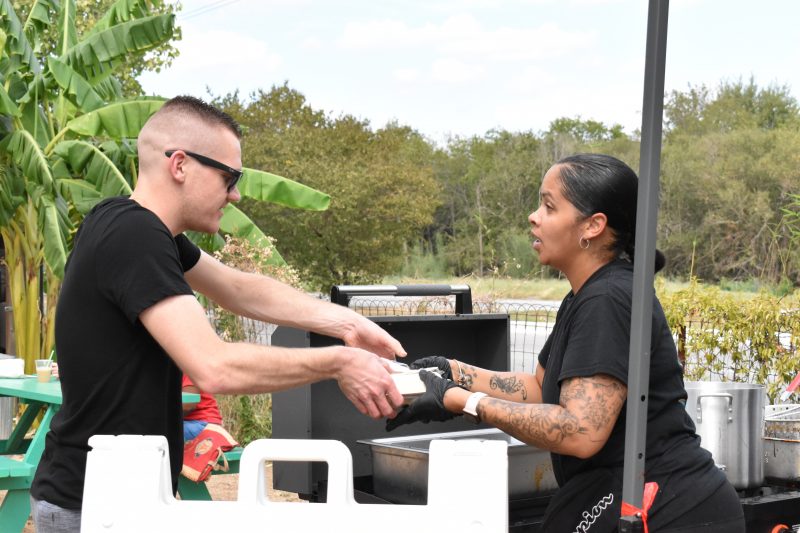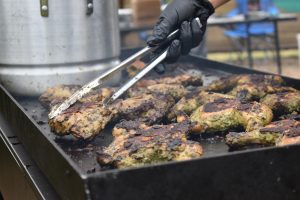From the Military to the Kitchen, These Veterans Are Choosing a Career That Brings Out Their Passion for Food
By Ana Paola Davila Chalita
Reporting Texas

Shirley Newell, right, started cooking in the Army and then opened a business specializing in Dominican food. Ana Paola Davila Chalita/Reporting Texas
The smell of spices and chicken had people lining up at an Austin food festival to get Shirley Newell’s Dominican food. The U.S. Army veteran was rapidly taking orders, flipping her marinated chicken and packing food to-go.
“Food is my comfort, my passion and how I express myself,” Newell said. “When I was in the military is when I actually started cooking.”
Deployed to South Korea, she would feel homesick for her mom’s food so she would call her for Dominican recipes. “I would try it several times until I perfected it,” she said.

Shirley Newell’s cooking is inspired by her Dominican heritage. Ana Paola Davila Chalita/Reporting Texas
Now, cooking is her livelihood. She started Phatty Boy food truck in San Marcos in April 2022, nine years after she left the Army as an automated logistics specialist.
According to the U.S. Census Bureau, veterans-owned businesses made up about 5.6% of all businesses. For some Texas veterans, opening food-service businesses feels like a natural step after their military career. Whether they missed home-cooked meals or were inspired by tasting new cuisines overseas, they say the military helped them find or develop a passion for cooking.
Like Newell, Gilbert Guerra intensified his love for food in the military, but for him it was about trying new flavors and cooking techniques, he believes food is “the one common language,” and recalls building connections with people who didn’t speak his language just by “naming spices and ingredients.”
Today he owns Catering G6, which opened while serving nearly 14 years in the Texas Army National Guard, where he is a master sergeant parachute rigger.
“The business is so busy that it’s a second full time job,” he said, “with the word of mouth it just keeps growing and growing.”
Guerra started giving back to the military by catering for them, currently to a unit in San Antonio, but he wants to keep expanding the initiative. =
He does this with a maximizing approach, “what we do is, we take their budget, and what they give us, we give them,” Guerra said. “It’s been a great experience and everyone’s so grateful.”
These veterans embarked on their entrepreneurial journey having to tackle problems like advertising. “The hardest part has been getting my name out there,” said Newell, “once they try my food, they love it, they’ll come back.”
For Eric Cruz, the leadership and organization part of it made sense, “but the business part has not been easy, is a learning curve, and it is challenging.”
Eric and Jessica Cruz own a Poki Bowl franchise in San Antonio which reflects the love they share for food.
Eric Cruz found new cuisines when stationed in Germany, South Korea and Hawaii. “The food that’s out there, I really enjoyed that,” he said.
The couple received help from a Veterans Entrepreneur Program helping veterans with the whole process so they don’t have to go through it alone.
“Opening a business is challenging enough,” said Megan Tamez, the director of the Veteran Entrepreneur Program, “add on all the additional obstacles that come with being a veteran.”
The Entrepreneur Program is part of the Texas Veterans Commission. Its purpose is to help veterans from start to finish when opening a new business.
It goes from verifying Veterans Certification Letters, to assistance in building their business brand, exploring financing, and understanding contracts.
The program, which began in 2013, has helped over 17,000 veteran startups with everything from marketing research and business plans to helping them secure grants and other financial assistance to launch their business.
Food trucks and coffee shops are among the businesses that veterans often create with help from the commission’s Veteran Entrepreneur Program.
“I had a friend of mine mention the Texas Veteran Commission,“ said Eric Cruz, “so I reached out to them.”
Eric Cruz retired as an Air Force master sergeant, serving 20 years and retiring in 2017 as an imagery/geospatial analyst. He felt good with the decision of leaving the military, “I was ready to do something else,” he said
Jessica Crruz served for 22 years before retiring in 2018 as a master sergeant specializing in signals intelligence and cyber analysis. “Going to the military, I tried flavors I’ve never tried before, and it really made me fall in love with different kinds of food.”
She was also ready to leave. “My passion was no longer in military service,” she said.
One thing Eric Cruz found similar between the military and having his own business is making sure that his employees are taken care of so they can get the job done. Something he says is similar to being in the military and “making sure that my airmen are taken care of so they can get the mission done.”
The four people working in the Veteran Entrepreneur Program are both veterans and small business owners, they are also certified business consultants and are able to give “ free consultation whenever they need, when it costs $300 an hour in the public sector,” Tamez said.
Opening a business is hard enough and, for Tamez, adding up the additional obstacles that comes with being a veteran makes it even harder. “It seems as if the odds are stacked against us,” she said, “we want to see veteran business owners succeed.”
“I’m still learning what resources are available within the Veterans Commission,” said Eric Cruz, “but it appears as if their networking is a useful resource in assisting veterans with business startups and recognition.”
The couple shared how the love for food goes from taking their daughter to try new food, to bonding over cooking together, “It brings me closer to my family, that’s what food means to me,” Jessica Cruz shared.
A burning passion for food is what these veteran food business owners have in common. It is also the reason why people come back once they’ve tried their cooking.
“Food is my comfort, my passion and how I can express my emotions,” said Newell.
“If I’m having a bad day I just cook something,” she continued saying, “every emotion, it always takes me to the kitchen.”